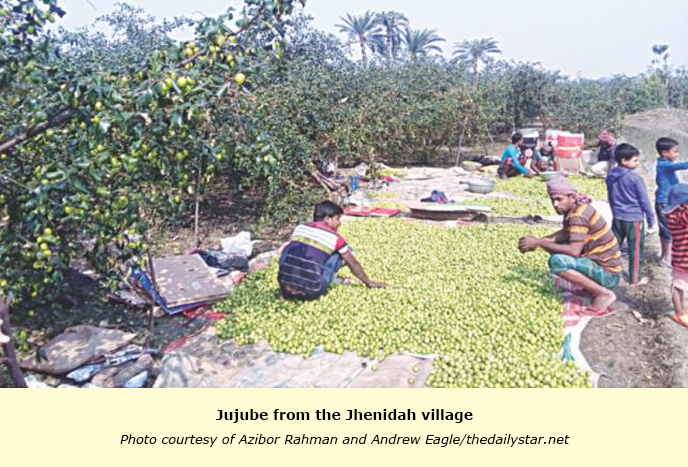Thought to have been domesticated in South Asia by 9,000 BCE, jujube has been enjoyed across the region for a very long time. Today, it would be hard to find a place in Bangladesh more closely associated with the fruit than the village of Bhatpara in Mandabaria union of Jhenidah’s Moheshpur upazila.

In Bhatpara, of the 3,000 bighas (481 ha) of farmland, 2,400 (385 ha) are dedicated to jujube orchards, primarily of the BAU kul variety. Jujube farming supports 800 of the 900 local families and brings a substantial Tk 30 lakhs (USD 46,000) per day into the village during the harvest season. It’s an agro-industry that’s brought solvency to many a villager.
Perhaps ironically for a fruit with an ancient heritage, Bhatpara’s jujube success story isn’t all that old. The crop was first introduced to the village in 2011 by local farmer Dr Taj Uddin, who planted it on 2.5 bighas (0.40 ha) that year. The crop did well and over the following years he increased his orchard’s size; moreover, inspired by his success other locals started to grow jujube too.
It was the start of a radical improvement in the village economy. Now that jujube is a proven winner, villagers without land of their own often lease it to grow the fruit.
“It costs around Tk 40,000 (USD 650) per bigha to grow jujube,” says one farmer, Liton Hossain. “From that we can expect a harvest of up to seven tonnes, which we can sell for approximately Tk 2.2 lakhs (USD 33,000).”
“Jujube farming is really worthwhile,” says his neighbour, Sabuj Hossain. “If I grew paddy on one bigha of land I would harvest twenty maunds to sell for about Tk 20,000 (USD 3,000). The profits from jujube are close to ten times greater.”
The local jujube harvest is sold nationwide. “I buy BAU kul in this village every year,” says Abdur Rahim, a trader from Jatrabari in the capital. “I sell it in several districts across the country. Jujube grown in Bhatpara is much tastier than from other areas.”
“Bhatpara has become famous for jujube,” says the chairman of Manderbaria union council, Shafidul Islam. “The village sends two or three truckloads of fruit to different parts of the country daily, during the harvest period.”
“In introducing jujube, Dr Taj Uddin did a great favour to this area and proved himself a successful entrepreneur,” says Moheshpur upazila’s agriculture officer Md Abu Talha. “Inspired by his success, around ninety percent of farmers now grow jujube.”
Evidence of the positive change in the local economy isn’t hard to find. Many villagers have been able to purchase land and motorbikes, and build brick homes.
